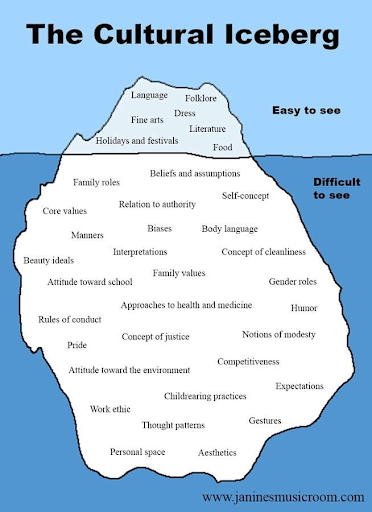From the Author’s Desk: Worldbuilding 101: Consider Your World’s Cultures

Thinking about the way different people behave is an integral part of worldbuilding. Often it impacts your story, but sometimes, it’s just background that gives readers the feeling that there is a lot more below the water’s surface–that the iceberg is indeed quite deep. One way to do that is to flesh out small details as well as the big picture ideas.
When it’s time to build the cultural practices of the people in your world, consider the following questions:
- What are the cultural practices of the people in your world? How are the cultural guidelines unique? Are they specific to different groups? In what way? (Do they brush their teeth with their toes? Do they leave their babies with strangers? Do they shave their heads before childbirth? Do they use distilled human remains to lengthen their lives like in Jupiter Ascending?)
- How do different groups of people view one another and why? What is the power dynamic between different groups (gender, race, country, etc.)? Are men in charge of women or vice versa or are they equal? Are certain races or nationalities seen in specific ways? (Women are subservient, Vikings are wild men, orcs are evil, Native Americans are noble savages, etc.).
- What religions exist in your world? How do they function and who follows them? How important is religion in this world—enough to fight wars over?
- Does slavery exist in your world? How does it work? Which group enslaves what other group? How do people become slaves and how can they be freed? How do other cultures view those who practice slavery?
- What is considered a family unit in this world? How does the average person define “family”? What determines who runs a family unit? Is it the breadwinner, the oldest, the one born under a good sign?
- Are small or big families common in your world? At what point has one reached a “big” family? Is this a social status thing—do lower classes have fewer children while higher classes have many?
- What is the general attitude toward birth control in your world? Is it available? Is it encouraged or frowned upon? Does abortion exist as a medical procedure or a concoction of plants? How do people view single parents?
- At what age is an inhabitant considered an adult? What is the average life expectancy for your people? How does social status affect that projection? Do wealthier people live longer?
- How is adulthood different from childhood? Is “childhood” a thing in your world or are children expected to behave like little adults from the time they can walk and communicate?
- What are common child rearing practices among inhabitants? How are children treated in your world? How do parents discipline their children? Are children expected to work right away or can they wait until they are older?
- What kind of stories are told to the children of your world? Is there a boogeyman? What are children taught to fear? To respect? Why?
- What kind of games do children play? Where do those games come from?
- What are some of the sports in your world? How are they played?
- What is considered art in your world? Is it the traditional Humanities (painting, sculpture, music, literature, etc.) or is there more to it? Do people argue about what is “art”? Is art valued in this world or seen as a waste of time and energy? Is reading stories or listening to music a treasured moment or a lazy indulgence?
- Can the average person in this world read? Are fiction/non-fiction books a thing, or are they oral stories, or both? How many books does the typical person in the world have at home? What kind of books would a person read—fiction, history, science?
- How do people relax in your world? What are some common hobbies? What activities would the average person do at home after the “major” work of the day is over—needlecraft, painting, sculpting, cooking, watching television?
- Is the schedule of the average person set by sunlight and everyone goes to sleep at sunset, or do people stay up after dark to do things? Is non-natural light available? How is the average day divided into work and play?
- Are there major holidays in your world? What are they? Where did they come from? How do inhabitants celebrate important days throughout the year? Do people celebrate equinoxes/solstices? Are certain days more important than others?
- How do inhabitants keep track of birthdays? Are they celebrated? Do birthdays involve cake and presents or something else? (Hobbits give away presents on their birthday.)
- What are common hygiene practices for the people? Do they bathe every day, wear perfume, wash their clothes often? Is there an industry of products around hygiene (hair, body wash, soap, make-up, etc.)?
- How much food does the average person have in their home? Is it common for people to make dinner at home, or do they grab food elsewhere? Is food delivery a thing in this world (Doordash, Uber eats, etc.)?
- What are some popular foods that are unique to your world? What is considered a lavish meal, an afternoon snack, a poor-man’s-breakfast?
- Is food preserved in some way, or is it all fresh? Do people store food for the winter because they must supply it themselves, or is it always available?
- What do the inhabitants of your world celebrate (birth, graduation, new cars)?
- What do they grieve (war, famine, death of a loved one)? What do they fear (spiders, zombies, pandemic)?
- What do they love (other people, satisfying pens, great advice)?
- Do people have pets? What is considered a normal pet in your world? Where is the line between a pet and a food source?
- What do people value? What is considered beautiful or handsome? What facial/body features are prized right now?
- Are certain traditions prized more than others? What practices are looked down on by most people?
- How much does the average person know about the cultural practices of other people?
Considering the answers to some of these questions when you aren’t writing will allow you to continue writing when you reach the moment when you need to insert a detail about one of these beliefs or behaviors or practices. Like thinking this way? Check out The General Worldbuilding Guide for more questions and fun activities!

